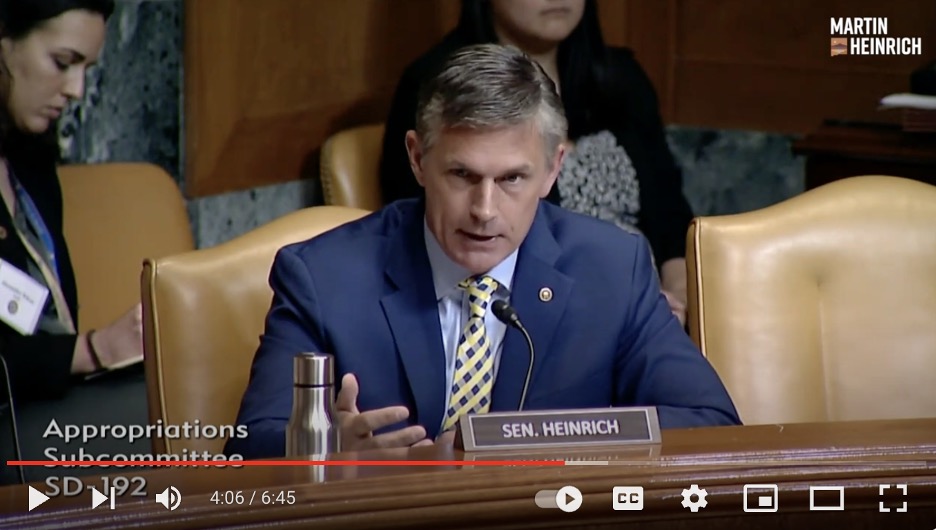Heinrich Questions NASA Administrator on Damage to Groundwater at White Sands Test Facility, NSF Director on Lack of Investment in Rural Institutions
Heinrich: “There is nothing more valuable to New Mexicans than their water.”
WASHINGTON – Today, during a hearing to review the Fiscal Year 2025 (FY25) Budget Request for the National Aeronautics and Space Administration (NASA) and the National Science Foundation (NSF), U.S. Senator Martin Heinrich (D-N.M.) pressed NASA Administrator Bill Nelson on NASA-caused damage to New Mexico’s groundwater at the White Sands Test Facility, and demanded that National Science Foundation (NSF) Director Dr. Sethuraman Panchanathan explain how the agency will give New Mexico’srural institutions a fair shot at securing federal research dollars after the elimination of the EPSCoR Track 1 program.
On the Need for NASA to Compensate New Mexico for Damage to Groundwater at White Sands Test Facility
Heinrich reiterated his calls for NASA to compensate New Mexico for the White Sands Test Facility’s groundwater contamination: “I've raised this with you in the past, but I want to be very clear that NASA needs to get this wrapped up and compensate the state of New Mexico. What's the status of your settlement negotiations with the New Mexico Natural Resources Trustee?”
Nelson acknowledged the urgent need for NASA to resolve the damage caused at White Sands Test Facility: “We have spent $200 million to date to investigate and address the groundwater issue. We continue to investigate the sources of contamination. NASA continues to work closely with the DOJ and New Mexico’s scientific and environmental agencies on what needs to be done to meet the final settlement discussions.”
Heinrich responded, insisting NASA commit to swiftly compensating New Mexico: “Before I was in Congress, I was the New Mexico Natural Resources Trustee. And I've got a lot of experience with federal agencies moving very slowly in those negotiations. So, I would urge you to simply try to get to yes and make sure it's on a reasonable timeline. There is nothing more valuable to New Mexicans than their water.”
Nelson affirmed his commitment: “Absolutely, we've done this in other states. And I can tell you straight up, that we will continue this in New Mexico.”
On Giving New Mexico a Fair Shot at Securing Federal Research Dollars, Eliminating Essential Program
Heinrich criticized the decision to do away with the EPSCoR Track 1 program, noting how the elimination of this program has hurt New Mexico: “The EPSCoR Track 1 program gave states like New Mexico a fair shot at securing federal research dollars. And the decision to do away with EPSCoR Track 1 has been a real blow to New Mexico in particular. I want to see the New Mexico EPSCoR state office funded and I want to ask you, will you work with me to get this done with some sort of bridge funding, while you sort out how to fill the gaps that were created by doing away with EPSCoR Track 1?
Dr. Panchanathan responded: “Senator, I want to characterize this right. What we have done with EPSCoR is not doing away with that program. What we have done is in fact is expanded, enriched, empowered more..."
Heinrich corrected Dr. Panchanathan, noting how the program’s elimination has resulted in a lack of funding for New Mexico: “But it has resulted in the New Mexico office not being funded.”
Dr. Panchanathan continued, “What we are trying to do is expand. Not just only EPSCoR jurisdiction funding, but through the E-CORE and E-RISE programs and the fellowship program. We hope we're able to have many institutions and more grants being made possible to EPSCoR states.”
Heinrich stood firm, “That sounds great, but that has not been our experience.”
Dr. Panchanathan answered Heinrich by stating that NSF will consider Heinrich’s question and work to be more helpful for New Mexico: “We are happy to take that, and see how we can be helpful. Thank you, Senator Heinrich."
###
